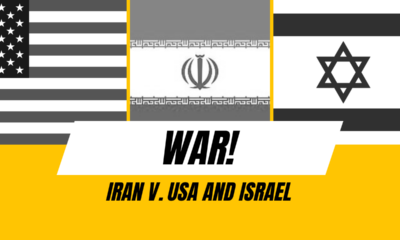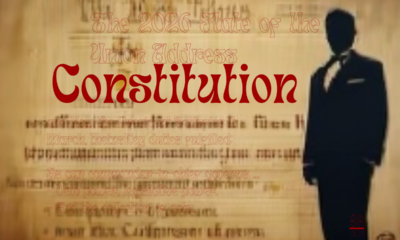Entertainment Today
Hunger Games: Your New Utopia

The Hunger Games (dir. Gary Ross; with Jennifer Lawrence, Josh Hutcherson, and Donald Sutherland; Lionsgate Pictures, 2012) came out on DVD, Blu-ray, download, and “video on demand” last Saturday (August 18). The three books (by Suzanne Collins) that form the basis of the film now outsell the seven Harry Potter books at Amazon.com. But how many people who read the books or see the film (and its one, maybe two sequels) will get the point? The Hunger Games is more than a young-adult adventure drama. It shows what America will look like under the totalitarianism that Barack Obama and his Czars have planned. It is exactly what Ronald Reagan warned us about.
The Hunger Games scenario
The Hunger Games takes place centuries later than today. Typically, the movie explains little. Seventy-four years before the story starts, war engulfed the North American country of Panem. (You pronounce that almost as two separate words.) Panem is a federation with one Capitol district and several outlying districts, 13 to start with, but now only 12). District 12 is Appalachia—coal country. From each District, the Capitol “peacekeepers” select one boy and one girl as “tributes” every year. They take them to the luxurious Capitol (aboard a high-speed train) and make a fuss over them for a few days. Then they release them in a forest (“The Arena”), where over the next several days they fight to the death on national television. These are the Hunger Games.
And that name says it all: the people of Panem, except those who live in the Capitol, are hungry. Chronically, grindingly hungry. District 12 is the worst. Food is always short, and many people starve, if they don’t die in the coal mines. But some children go out into the forest to kill squirrels for food. (That they can do that is interesting in itself. The authorities fence off that forest and label it as electric. But the electricity hasn’t flowed through that fence since anyone can remember.)
Katniss Everdeen (Jennifer Lawrence) survives that way. In fact, she has earned a reputation for her unerring archery. When the Peacekeepers select her younger sister as a tribute, she volunteers in her place. She and the boy tribute (Josh Hutcherson) travel to the Capitol, where they train for the Hunger Games and compete for sponsors—Capitol dwellers who might have the Gamesmaster deliver them extra food, water, medicines, or other supplies.
Then comes Game day, when they must live by their wits. In The Arena, temporary alliances form and break off, depending on who can take advantage. Rules change, revert, and change again, on the whim of the Gamesmaster. Finally (as everyone knows by now) Katniss and her fellow tribute come out on top.
But another drama plays out, one that the book (being a first-person narrative) could not describe. Coriolanus Snow (Donald Sutherland), President of Panem, is not happy with how his Gamesmaster runs the pre-game shows. The Hunger Games themselves end in a way that scares him badly. The reason: Snow always knew that hope was a stronger way to hold the people in thrall than fear. But too much hope for one or two Game players can turn into hope for something bigger: freedom for all. (Ms. Collins probably named Snow after Gaius Marcius Coriolanus, a famous Roman general in the early years of the Roman Republic. Plutarch wrote about him, as did Shakespeare.)
An allegory for today
The Hunger Games excels at showing what a totalitarian society looks like. The Capitol is the place of privilege, and of the elite. The Districts are classic provinces—conquered places. The Capitol is a party that never ends. Life in the Districts is hard, bitter, and short for all sorts of reasons. President Snow says it best: the Districts produce goods for the people in the Capitol to enjoy. The Districts get what’s left over.
The only relief is the annual Hunger Games. And the tag line of the Hunger Games shows is priceless:
May the odds be ever in your favor.
How appropriate for today. Madalyn Murray O’Hair would no doubt approve. So would her intellectual heirs, the American Atheists. They are suing to remove the “Nine-eleven Cross” from the Ground Zero memorial. They say that looking at that cross makes them sick. And of course, all they offer as hope for their fellow human beings is just that kind of tag line:
May the odds be ever in your favor.
To see The Hunger Games, you can’t tell whether the Capitol is a “classic” left-wing government or a right-wing government. Collins and Ross left it that way by design. But Ronald Reagan, 48 years ago, knew it made no difference:
You and I are told increasingly we have to choose between a left or right. Well I’d like to suggest there is no such thing as a left or right. There’s only an up or down—[up] man’s old—old-aged dream, the ultimate in individual freedom consistent with law and order, or down to the ant heap of totalitarianism. And regardless of their sincerity, their humanitarian motives, those who would trade our freedom for security have embarked on this downward course.
The Hunger Games world has its soup lines, and humiliates those who stand in them. Liberals call that “right-wing”policy. It isn’t. Lines like that formed in the old Soviet Union. When votes don’t really count anymore, or when the government doesn’t take them, the government doesn’t care anymore for those who used to cast them.
Reagan anticipated that, too. He talked about vote-harvesting time. Funny. In The Hunger Games, the Capitol authorities call it a reaping when they pick the tributes.
Notice also that only one character in The Hunger Games is truly, authentically alive: Katniss Everdeen. Everyone else, including Coriolanus Snow and his party-dressed subjects in the Capitol, might as well be dead. And except maybe for Katniss’ coach, they don’t want to live. They want her to die. Because Katniss Everdeen takes care of herself. She always has. That’s how she wins, even against a team of obvious ringers (the “career tributes”).
But Reagan said one other thing that should make one wonder whether Suzanne Collins might have cribbed from him:
This is the issue of this election: Whether we believe in our capacity for self-government or whether we abandon the American revolution and confess that a little intellectual elite in a far-distant capitol can plan our lives for us better than we can plan them ourselves.
A far-distant capitol. Spelled with an o, not an a. The Capitol in The Hunger Games is the perfect metaphor for what Barack Obama and his Czars have turned our capital into. Long before Susanne Collins was born, Ronald Reagan warned the American people not to travel that road. We did not heed that warning. So The Hunger Games is our future.
Forget the odds. May God help us.
Related:
American leadership: the world’s best hope
Terry A. Hurlbut has been a student of politics, philosophy, and science for more than 35 years. He is a graduate of Yale College and has served as a physician-level laboratory administrator in a 250-bed community hospital. He also is a serious student of the Bible, is conversant in its two primary original languages, and has followed the creation-science movement closely since 1993.
-

 Civilization2 days ago
Civilization2 days agoIran – the war begins
-

 Civilization2 days ago
Civilization2 days agoState of the Union – a response
-

 Education5 days ago
Education5 days agoIgnoring the Science: The Curious Case of Cell Phone Bans
-

 Civilization5 days ago
Civilization5 days agoA Better U.S. Strategy for Greenland Than Annexation
-

 Executive4 days ago
Executive4 days agoWaste of the Day: Utah University Trustees Don’t Know Their Job
-

 Civilization4 days ago
Civilization4 days agoTrump’s Longest Speech, His Shortest Margin for Error
-

 Executive2 days ago
Executive2 days agoWaste of the Day: Improper Payments Totaled $186 Billion in 2025
-

 Executive3 days ago
Executive3 days agoGavin Newsom, You’re Better Than This








I really hate the fact that every damn film featuring archery has to use those abysmal back quivers. They’re hopeless. In fact all quivers are hopeless. Real archers use an arrow bag.
Apart from that, though, it was a good film. I don’t agree with you that this is Obama’s plan for America, of course, but it’s certainly a good portrayal of the dangers of totalitarianism. Not quite up there with Richard Burton as O’Brien in 1984, but not at all bad.
How about a hip quiver? It fastens to your belt and slings at your side. I suppose that those films use the back quiver because the director wants something that looks like the gear that Robin Hood used. (The Lion, the Witch, and the Wardrobe needed to stick to tradition; a hip quiver would have been anachronistic. Same for any retelling of the Robin Hood story. But I agree: there’s no reason to have a modern or ultra-modern archer sling a quiver on her back, instead of at her hip.)
The idea of Robin Hood’s back quiver is a Hollywood invention. There is no trace at all of a back quiver being used in the Middle Ages. Given that the English longbow technique involves holding the bow at waist level to nock the arrow then starting to draw as you raise it into the shooting stance, having to grab arrows from above your head makes no sense. Hip quivers were used by hunters but, being open-topped, quivers in general aren’t all that suitable for an archer who might spend long periods out in the rain (which can destroy fletchings) and who has to run around a battlefield. I’d imagine it would be a bit distressing to leg it to face a new French attack then find that all your arrows have fallen out.
Military archers were issued arrows in bundles of 24, protected by a linen bag. They would either take the arrows out and stick them in the ground near their feet or simply roll down the end of the bag and shove it through their belt. As a historical archer I do that myself, and it works just fine. Quivers also tend to be small, holding six or at most a dozen arrows, whereas with a full sheaf of 24 in your belt and another couple slung over your shoulder you can enforce quite a bit of royal displeasure on the dastardly Frog.
Read the books. Saw the movie. You missed the point. Its anti totalitarianism, true. More importantly, its anti consumer culture and commentary on the entertainment industry. its a very populist book. You would be hard pressed to call it a “Liberal Utopia”. Liberals would ideally tax the wealthy capitol residents to aid those in district 12 and so forth. Its a capitalist Utopia, those at the top economically have all the control, and those who arent with them are stuck at the bottom.
Its commentary on American society but ALL of us are guilty for creating a society that could end up like that
You’ve forgotten again. The system with its Capitol and Districts is the result of nearly three quarters of a century of government privilege and throwing scraps to the common people. It is the endpoint—or the endgame.
If those Districts broke away from the Capitol (I said if because I don’t want to spoil things too much), the result would be freedom, decentralization, independence, and trade. By voluntary consent, and I do not mean “volunteering for tribute.” And those are not liberal values. They are classic Constitutional values.
“And those are not liberal values. They are classic Constitutional values.”
They’re also classical liberal values as expressed by Locke, Madison and Smith.
Ah, but they are not modern “liberal” values, are they?
“Ah, but they are not modern “liberal” values, are they?”
They’re my modern liberal values. I also point you, once again, to the junior (and more right-wing) coalition partner in Germany’s government, the FDP – generally known as Die Liberalen.
[…] an end to government spending. But it will also put an end to civilization as the real ”Hunger Games” begin. And you, Mr. Phony Conservative, Representative RINO Paul Ryan, and your Republican […]
[…] Another compared it to the decadent Capitol District celebrations from The Hunger Games. […]